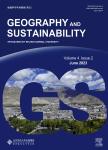(Re)assessing Climate-Smart Agriculture practices for sustainable food systems outcomes in sub-Saharan Africa:The case of Bono East Region,Ghana
作者机构:Deparment of GeographyEnvironment and Geomatics&Guelph Institute of Development StudiesCollege of Social and Applied Human ScienceUniversity of Guelph50 Stone Rd EGuelphON N1H 2W1 Canada Global Agri-Business Solutions INC.54-480 Grey StreetBrantfordON N3S 7S5 Canada Deparment of Food Agricultural and Resource EconomicsOntario Agriculture CollegeUniversity of Guelph50 Stone Rd EGuelphON N1G 2W1 Canada Department of GeographyEnvironment and Geomatics&Arrell Food InstituteUniversity of Guelph50 Stone Rd EGuelphON N1H 2W1 Canada
出 版 物:《Geography and Sustainability》 (地理学与可持续性(英文))
年 卷 期:2023年第4卷第2期
页 面:112-126页
核心收录:
学科分类:09[农学] 0903[农学-农业资源与环境] 0705[理学-地理学]
主 题:Climate adaptation Climate-Smart Agriculture Ghana Smallholder farmers Sustainable food systems Sub-Saharan Africa
摘 要:This research paper assesses the reality of Climate-Smart Agriculture(CSA)practices’potential to promote the outcomes of sustainable food systems(SFS)within Ghana’s smallholding agriculture context.The study demon-strates that rural farmers generally perceive CSA’s contribution to‘food and nutrition security’and‘economic performance’as more important than CSA’s contribution to‘social equity’and‘environmental stewardship’.From a narrow perspective,the study demonstrates that farmers perceive CSA’s potential to‘prevent pest and disease outbreaks’and‘increase human capital information’as the most important contribution of CSA to SFS outcomes.In contrast,CSA’s potential to promote environmental stewardship is perceived as the least important among Ghana’s rural farmers.This enormity of displacement of smallholders’perceptions at large is motivated by de-mographic,socioeconomic and ecological factors.Moreso,the CSA for SFS outcomes narratives is driven by farmers’self-apprise,social networks and other local information dissemination agents.Furthermore,research findings suggest farmers’awareness of CSA practices and interventions is deficient owing to unmet training and information needs for approximately 82%of the CSA practices and interventions.This situation elucidates the dichotomy of CSA practices’narratives as tools for attaining food,nutrition security and economic performance to the detriment of critical issues such as increasing awareness and building farmers’capacity to engage with CSA practices while also managing socio-ecological trade-offs that emerge over time due to engagement with CSA.Critical(re)orientation is needed across the scale to drive CSA practices and interventions that confine cli-mate adaptation and food production practices within safe planetary boundaries without undermining social,economic,food and nutrition security needs.



